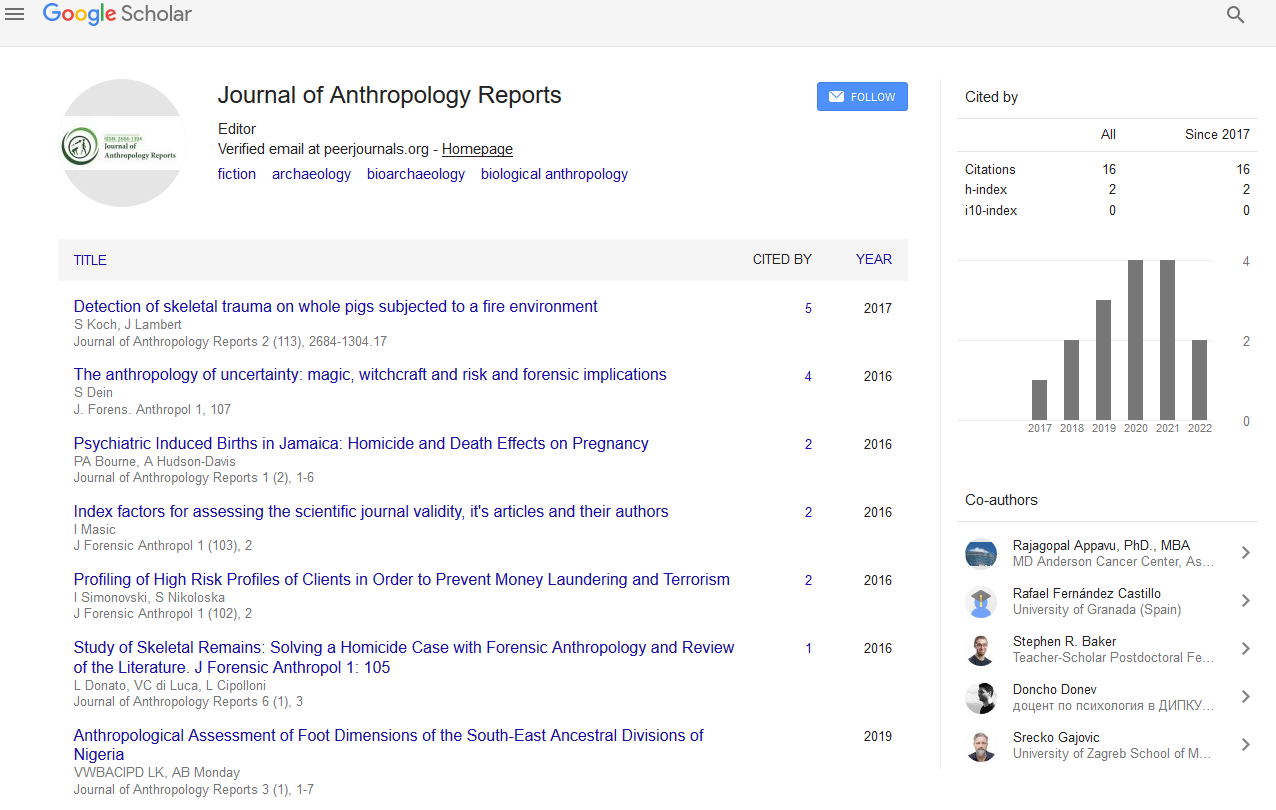Indexed In
- RefSeek
- Hamdard University
- EBSCO A-Z
Useful Links
Share This Page
Journal Flyer

Open Access Journals
- Agri and Aquaculture
- Biochemistry
- Bioinformatics & Systems Biology
- Business & Management
- Chemistry
- Clinical Sciences
- Engineering
- Food & Nutrition
- General Science
- Genetics & Molecular Biology
- Immunology & Microbiology
- Medical Sciences
- Neuroscience & Psychology
- Nursing & Health Care
- Pharmaceutical Sciences
Opinion Article - (2024) Volume 7, Issue 1
Exploring Diversity through Anthropological Lens
Maya Patel*Received: 05-Mar-2024, Manuscript No. JFA-24-25374; Editor assigned: 07-Mar-2024, Pre QC No. JFA-24-25374 (PQ); Reviewed: 21-Mar-2024, QC No. JFA-24-25374 (QC); Revised: 28-Mar-2024, Manuscript No. JFA-24-25374 (R); Published: 04-Apr-2024, DOI: 10.35248/2684-1304.24.7.188
Description
Anthropology, as a discipline, provide as a pathway to understanding the rich blend of human diversity that exists across the globe. Through the anthropological lens, scholars delve into the difficult of cultures, societies, and behaviors, resolving the complexities of human existence. In this opinion article, we explore the importance of anthropology in uncovering and celebrating diversity, highlighting its role in promoting cross-cultural understanding and f encouraging empathy.
At its core, anthropology is a discipline rooted in interest and respect for cultural differences. Cultural anthropology, in particular, focuses on the study of human cultures, traditions, and social norms, aiming to understand the unique ways in which people make meaning of their lives and navigate their social worlds. Through ethnographic research—immersion in and observation of communities-anthropologists gain insights into the diverse practices, beliefs, and values that shape human behavior.
One of the fundamental contributions of anthropology is its ability to challenge ethnocentrism-the tendency to judge other cultures through the lens of one's own cultural norms and values. By adopting a relativistic perspective, anthropologists recognize that there are no universal standards for what is "normal" or "right." Instead, they strive to understand cultural practices within their specific contexts, acknowledging the diversity of human experience and the validity of different ways of being in the world.
Anthropology also confronts stereotypes and misconceptions by providing complicated interpretations of cultural practices. For example, rituals and customs that may seem strange or irrational to outsiders often hold deep symbolic meanings within their respective cultural contexts. By exploring the underlying significance of these practices, anthropologists debunk stereotypes and encourage appreciation for the diversity of human expression.
Moreover, anthropology serves as a platform for amplifying marginalized voices and highlighting the experiences of historically underrepresented groups. Through participatory research methods and community engagement, anthropologists collaborate with local communities to co-produce knowledge and advocate for social change. Whether documenting indigenous land rights, refugee resettlement, or gender dynamics, anthropologists play a vital role in explain on issues of social justice and inequality.
In recent years, anthropology has also embraced intersectionalitythe recognition that individuals and communities are shaped by multiple intersecting identities, such as race, class, gender, sexuality, and nationality. This intersectional approach allows anthropologists to explore how power and privilege operate within and across different social groups, highlighting the complexities of identity and belonging in diverse societies. By centering the experiences of marginalized individuals and communities, anthropology contributes to broader conversations about equity and inclusion.
Furthermore, anthropology facilitates dialogue and exchange across cultural boundaries, encouraging mutual respect and understanding among people from different backgrounds. By facilitating intercultural communication and empathy, anthropology lays the groundwork for building more inclusive and harmonious societies. In an increasingly globalized world, where cultural encounters are inevitable, the skills and perspectives offered by anthropology are more valuable than ever.
However, anthropology is not without its challenges. The discipline has faced criticism for its colonial legacy and its role in perpetuating unequal power dynamics. Early anthropologists often exoticized and objectified non-Western cultures, reinforcing narratives of cultural superiority. Moreover, anthropology has been accused of reproducing hierarchies of knowledge, privileging Western perspectives over indigenous ways of knowing.
In response to these critiques, contemporary anthropology has undergone a change of opinion, grabbing a more reflexive and ethical approach to research. Anthropologists now strive to collaborate with local communities, prioritizing their agency and perspectives in the research process. Moreover, anthropology has increasingly embraced interdisciplinary collaborations, recognizing the interconnectedness of human phenomena. By working across disciplines, anthropologists enrich their research and contribute to more holistic understandings of complex social issues.
Conclusion
In conclusion, anthropology plays a importanyt role in exploring celebrating diversity, challenging stereotypes, and promoting cross-cultural understanding. By grabbing cultural relativism, amplifying marginalized voices, and encouraging empathy, anthropology contributes to the creation of more inclusive and equitable societies. As we navigate an increasingly diverse and interconnected world, the insights offered by anthropology are more relevant and necessary than ever before.
Citation: Patel M (2024) Exploring Diversity through Anthropological Lens. J Anthropol Rep. 7:188.
Copyright: © 2024 Patel M. This is an open-access article distributed under the terms of the Creative Commons Attribution License, which permits unrestricted use, distribution, and reproduction in any medium, provided the original author and source are credited.

